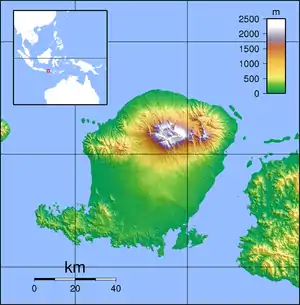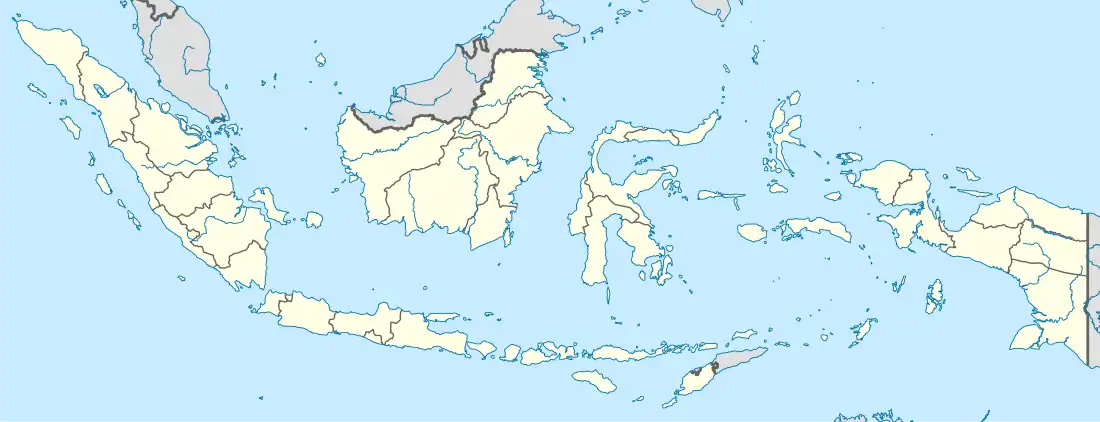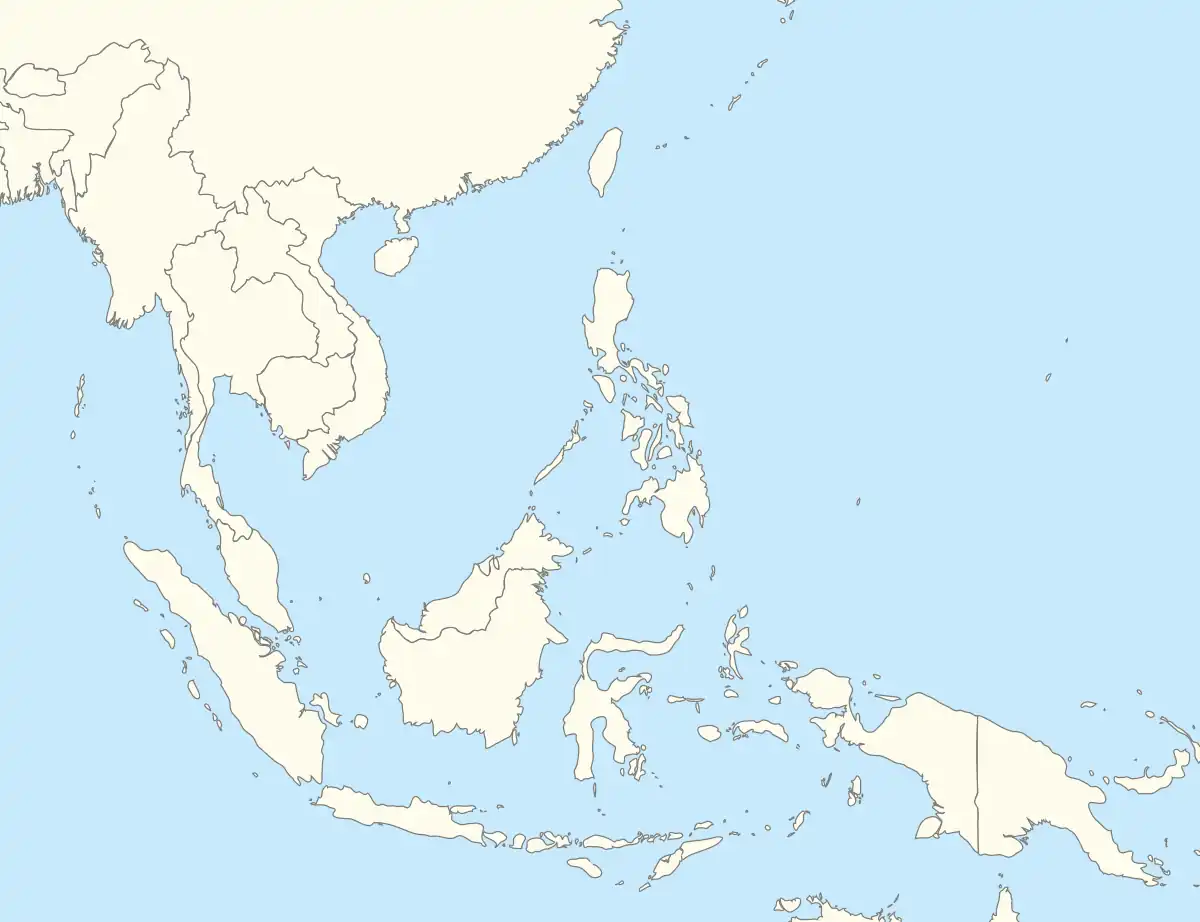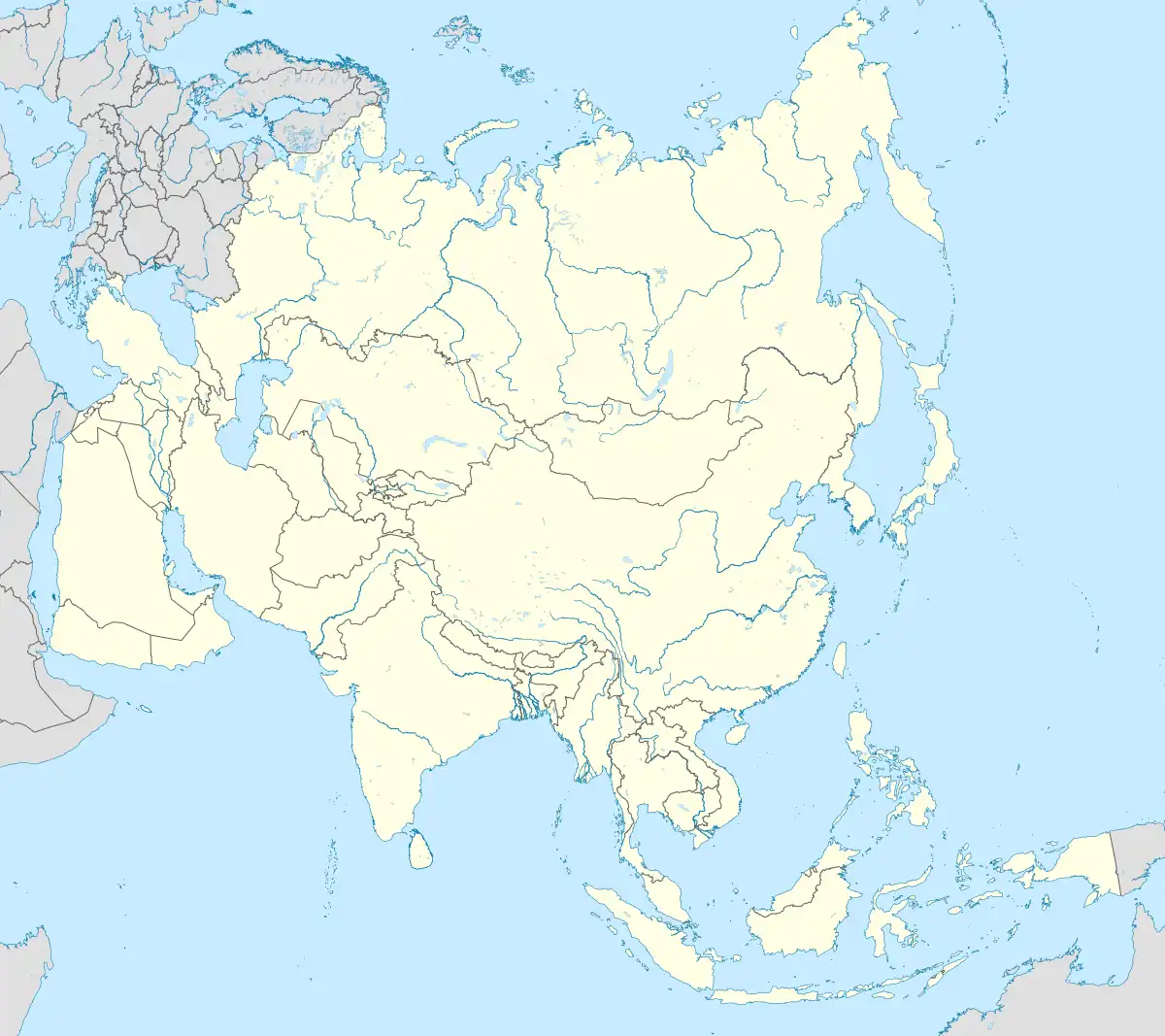Lombok International Airport
Lombok International Airport, (Indonesian: Bandar Udara Internasional Lombok) (IATA: LOP, ICAO: WADL)[1] also known as Zainuddin Abdul Madjid International Airport,[2] is an international airport on the island of Lombok in Indonesia. It is the island's only fully operational airport.[3][2]
Lombok International Airport Bandar Udara Internasional Lombok | |||||||||||
|---|---|---|---|---|---|---|---|---|---|---|---|
 | |||||||||||
| Summary | |||||||||||
| Airport type | Public | ||||||||||
| Owner | Government of Indonesia | ||||||||||
| Operator | PT Angkasa Pura I | ||||||||||
| Serves | Lombok | ||||||||||
| Location | Central Lombok Regency, West Nusa Tenggara, Indonesia | ||||||||||
| Opened | 20 October 2011 | ||||||||||
| Focus city for | |||||||||||
| Time zone | WITA (UTC+08:00) | ||||||||||
| Elevation AMSL | 319 ft / 97 m | ||||||||||
| Coordinates | 08°45′29″S 116°16′35″E | ||||||||||
| Website | www.lombok-airport.co.id | ||||||||||
| Maps | |||||||||||
 Location in West Nusa Tenggara Province, Indonesia | |||||||||||
 LOP /WADL Location of the airport in Lombok  LOP /WADL LOP /WADL (Indonesia)  LOP /WADL LOP /WADL (Southeast Asia)  LOP /WADL LOP /WADL (Asia) | |||||||||||
| Runways | |||||||||||
| |||||||||||
| Statistics (2018) | |||||||||||
| |||||||||||
It replaced Selaparang Airport,[4] the island's previous sole operational airport, in Ampenan on the west coast of Lombok near the capital of Mataram.
The new facility was officially inaugurated by the president of Indonesia, Susilo Bambang Yudhoyono on 20 October 2011. The airport can accommodate widebody high capacity Airbus A330 and Boeing 777 airliners, as well as smaller aircraft such as the Boeing 737 and Airbus A320 family which were already serving Lombok.[5] The first arriving aircraft was a Garuda Indonesia Boeing 737-800NG marking the commencement of operations on 1 October 2011.[6]
Naming
Bandara Internasional Lombok (BIL) had several operational names proposed. In January 2009 results of a public opinion poll conducted in Lombok indicated that Lombok International Airport (LIA) was chosen by 40.4% of respondents, Sasak International Airport (SIA) 20%, Rinjani International Airport (RIA) 46 16.7%, Mandalika the International Airport (MIA) 10.9%, Selaparang International Airport ( SIA) 8%, Pejanggik International Airport (PIA) 2.9%, and Arya Banjar Brittle International Airport (ABGIA) 1.1%.[7]
According to the airport's official website, the name is Lombok International Airport in English, and Bandar Udara Internasional Lombok in Indonesian.[1] It is referred to as Zainuddin Abdul Madjid International Airport in some sources.[2][8] Muhammad Zainuddin Abdul Madjid was an ulema from Lombok which founded Nahdlatul Wathan, a prominent Islamic organization in the province.
The IATA code "LOP" only came into formal use in late November 2011. Before that the IATA code AMI, from Selaparang, was used by the airlines servicing the airport. Garuda and Batavia began to partially adopt the LOP code in their booking and ticketing systems at that time. Lion Air was using AMI at the end of November 2011; however, all flights were operating solely to and from Lombok International Airport.
Location
The airport site is at Tanak Awu, in Kabupaten Lombok Tengah (Regency of Central Lombok), Lombok, Indonesia, southwest of Mataram the provincial capital of Nusa Tenggara Barat and a few kilometers southwest of the small regional city of Praya.
The airport has a land area of about 551.8 hectares.[9][10] Lombok International Airport has the second largest area after Soekarno–Hatta International Airport at the time of the opening of the airport.[11]
Airlines and destinations
When the Lombok International Airport became operational, all the flight schedules at Lombok's Selaparang Airport were moved to the new facility.
As Selaparang Airport never accommodated widebody aircraft, it is expected that further international and domestic services will soon supplement the existing routes providing higher passenger loads and freight volumes to those of the airport at Ampenan.



Passenger
Public facilities and access
The airport is served by road links to the city of Mataram which is approximately 40 km to the northwest of the airport. It is approximately 55 km southeast of the established Senggigi tourism precinct of West Lombok. An integral component of the airport project was the building of a new link road to the city of Mataram to provide ready access to the city and tourism facilities on the west coast of the island. At the time of opening in late 2011 some sections of the new road remained incomplete. The developing area of Kuta and Selong Blanak lie 30 minutes to the south and provide some reasonably developed tourist facilities including hotels and restaurants.
The airport is not served by rail connections, and there are none available on the island.
The site is some distance from existing townships and external services; the nearest regional city is Praya, to the immediate north of the airport.
A tour desk, booking kiosks, and other facilities are available at the main terminal.
Car and bus parking
The airport has extensive paved parking areas at the main terminal and smaller facilities for the cargo terminal and administrative areas. Entrance is by a single controlled access point to the nearby highway.
Public bus services
Perum DAMRI provide a public airport shuttle service to Terminal Mandalika ('city bus terminal') on the eastern outskirts of Mataram and on to the west coast at Senggigi. The public bus service uses a dedicated fleet of modern air-conditioned buses and provides a scheduled service for set fees.
Taxi services
When the airport services were moved across from the previous facilities at Selaparang the Airport Taksi Koperasi moved operations to BIL. Upon the commencement of services from BIL they ceased to provide a set distance pre-paid docket system and adopted a metered ('argometer') method of charging for distance traveled. The airport taxi service is supplemented by metered taxis provided by the two established operators: Bluebird Taxi and Express Taxi.
Charter
Helicopter and fixed wing charter services are available by prior arrangement.
Development
The airport is undergoing a massive development project. After completion, the passenger capacity will be increased to 7.5 million, the runway will be expanded to 3,300 meters to allow wide bodied aircraft.
Phase I (2006–2009)
- Runway: 45 m x 2500 m
- Apron: 52,074 m2
- Taxiway: 2 exit taxiways
- Terminal: 12,000 m2 (passenger, VIP, cargo)
- Carpark: 17,500 m2
Phase II (2013–2015)
- Runway: 45m x 2750m
- Apron: 63,294 m2
- Taxiway: 2 exit taxiways
- Terminal: 16,500 m2 (2.4M passengers per year)
- Carpark: 29,100 m2
Phase III (2028)
- Runway: 45 m x 4,000 m
- Apron: 74,514 m2
- Taxiway: 12 exit taxiways, 2 rapid exit taxiways, 1 parallel taxiway
- Terminal: 28,750 m2 (3.25M passengers per year)
- Carpark: 29,100 m2[15]
Statistics
| Airfield system[16] | Phase 2 | Phase 3 |
|---|---|---|
| Runway length | 2,750 m | 4,000 m |
| Runway width | 45 m | 45 m |
| Runway shoulders | 30 m | 30 m |
| Runway strips | 2,870 m x 300 m | 4,120 m x 300 m |
| Runway end safety area | 90 m x 90 m | 90 m x 90 m |
| Taxiway requirements | Two apron exits | Full parallel |
| Taxiway width | 23 m | 23 m |
| Taxiway shoulder | 7.5 m | 10.5 m |
| RW-TW separation | 192 m | 192 m |
| Apron service road width | 10 m | 10 m |
| Support area service road width | 7 m | 7 m |
| Airfield inspection road width | 5 m | 5 m |
| Security fence height | 2 m | 2 m |
| Aircraft parking areas | Phase 2 | Phase 3 |
| Aircraft parking requirement | 10 | 30 |
| Aircraft apron area | 53,200 m | 300,000 sm |
| Air cargo apron | 28,000 sm | |
| General aviation apron | 25,000 sm | |
| Navigational aids | Phase 2 | Phase 3 |
| Air traffic control tower | 23 m high | 23 m high |
| Precision landing system | R/W 13 ILS | R/W 13 ILS |
| Runway lighting | High intensity | High intensity |
| Other NAVAIDs | DME, DVOR NDB | DME, DVOR NDB |
Fire fighting and emergency services
- Category VIII – trained personnel, 30
- Foam tender – Type I
- Foam tender – Type II
- Crash car type 1 – 3 units
- Rescue tender – I unit
- Rescue boat – 2 units
- Nurse tender – 1 unit
- Ambulance – 1 unit
- Utility car – 2 unit
- Tanker – 2 units
- Commando car – 1 unit
The airport has no capability for the removal of disabled aircraft.[17]
Airport facilities and services
- Cargo handling facilities are provided by PT Gapura, PT. Jas, PT PTN, PT Kokapura
- Fuelling facilities – Avtur 50 / Jet A1 – 2 dispenser cap 550 KL, 3 tank refueller@12 KL 1 tank refueller @ 15 KL
- De-icing facilities – none
- Hangar space for visiting aircraft – none
- Repair facilities for visiting aircraft – none
- AD administration – Mon–Thu: 00.00 – 08.30, Fri: 23.00–07.30
- Custom and Immigration – Mon–Sun: 2300–1300
- Health and Sanitation – Mon–Sun: 2300–1300
- AIS Briefing Office – Mon–Sun: 2300–1300
- ATS Reporting Office – Mon–Sun: 2300–1300
- MET Briefing Office – Mon–Sun: 2300–1300
- ATS – Mon–Sun: 2300–1300
- Security – 24hrs
Information on flight procedures, communication procedures and airfield beacon and navigational aids were published by the Directorate General of Civil Aviation (Indonesia) in an AIRAC document published on 28 July 2011 with an effective date of 22 September 2011.[17]
Aircraft types
B747, B767, A350, A340, A330, B777, C130, A320, B737-900, CRJ1000, F100, F28, F50, IL-96, SSJ-100, MA60, ATR 72, CN235,[17] XL2.
Aircraft parking stands
- Stands Nr. 5 and 7 – available for B747, A330, B777, or below. Avio–Bridge available, with a RLG visual docking guidance system installed.
- Stands Nr. 1, 2, 3, 4, 6, 8, 9 and 10 – available for B737-900 or below
- Security line apron taxiway – 76.00 m (distance)[17]
Flight schools
The airport is the base of local flight training academy "LIFT" (Lombok Institute of Flight Technology) operating 3 Liberty XL2 training aircraft 6 days per week.[18]
References
- "Lombok International Airport". Lombok International Airport. Retrieved 23 August 2021.
- "Lombok Zainuddin Abdul Madjid International Airport Profile". Centre for Aviation. Retrieved 23 August 2021.
- IATA. "IATA - Codes - Airline and Airport Codes Search". Retrieved 4 June 2015.
- "It's for Real: Lombok Finally Has Its International Airport". The Jakarta Globe. Archived from the original on 5 November 2012. Retrieved 4 June 2015.
- "Lombok International Airport to operate soon". Retrieved 4 June 2015.
- "Island in focus: New airport begins service". 3 October 2011.
- "Lalu Wiratmaja Inginkan Gajah Mada Airport Untuk BIL". Paket Wisata Lombok Tour Open Trip Lombok Gili Trawangan Rinjani Murah (in Indonesian). 20 August 2017. Archived from the original on 20 August 2017. Retrieved 23 August 2021.
- "Lombok/Zainuddin Abdul Madjid International Airport". SKYbrary Aviation Safety. 25 February 2021. Retrieved 23 August 2021.
- "New airport to 'support' tourism beyond Bali | The Jakarta Post".
- "President dedicates new Lombok airport". 20 October 2011.
- "Alhamdulillah, BIL Mulai Dioperasikan". 1 October 2011.
- Hidayat, Ali Akhmad Noor (8 October 2023). "Maskapai Citilink Terbang Perdana Rute Lombok ke Bima". Tempo. Retrieved 27 October 2023.
- Andrew (21 September 2022). "Scoot launching Lombok and Yogyakarta flights". Mainly Miles.
- "MULAI 23 AGUSTUS 2023 SUPER AIR JET TERBANG LANGSUNG KE KUALA LUMPUR DARI LOMBOK DAN SURABAYA". agent.lionair.co.id. 1 August 2023.
- Lombok Times Daily, issue #62, February – March 2009
- New Lombok International Airport, The Directorate General of Air Communication, and PT. (Persero) Angkasa Pura 1, Project Summary, Jakarta, 4 January 2005
- "Archived copy" (PDF). Archived from the original (PDF) on 4 March 2016. Retrieved 20 September 2011.
{{cite web}}: CS1 maint: archived copy as title (link) - "LIFT Academy | Learn To Fly With Passion". Lift Academy. Retrieved 18 March 2023.
External links
- PT. Angkasa Pura 1 (PERSERO)
- Bandara Internasional Lombok official website
- Kabupaten Lombok Tengah, the Regency of Central Lombok
- Directorate General of Civil Aviation Republic of Indonesia